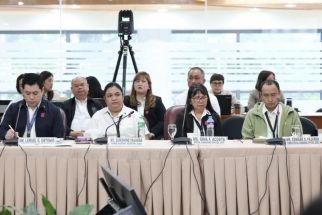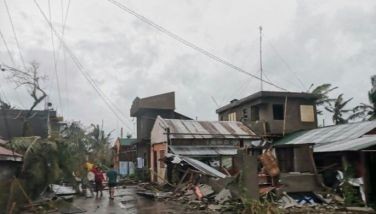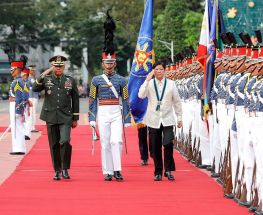‘Sayyaf sneaking in as deportees’
September 4, 2002 | 12:00am
ZAMBOANGA CITY — Police authorities have warned intelligence agents about the possible re-entry into the country of Abu Sayyaf terrorists and other criminals disguised as Sabah deportees.
The alert was raised following police reports that Abu Sayyaf terrorists had slipped into Sabah in the wake of the massive military operations against them in Basilan and Sulu.
Chief Superintendent Simeon Dizon, police director for Western Mindanao, said some of the Abu Sayyaf guerrillas who fled to Malaysia were involved in the pillage of Ipil town in Zamboanga del Sur on April 4, 1995.
"Camp Crame has directed us, and we have coordinated with the ARMM-PNP (Autonomous Region in Muslim Mindanao-Philippine National Police), to alert its intelligence unit and monitor the bandits who might be disguised as deportees," Dizon said.
Meanwhile, the government, through the Department of Social Welfare and Development (DSWD), has started "seriously but quietly looking into" reports of rape and other sexual abuse of detained Filipino women in various holding centers in Sabah, Press Secretary Ignacio Bunye said.
While the government has not confirmed yet allegations of sexual abuse, Bunye said the President would wait for the official report by the special mission to Sabah led by Nur Jaafar dispatched to investigate the situation of Filipino deportees.
The mission of Jaafar, who is presidential adviser on Mindanao affairs, arrived on Monday in Kota Kinabalu, one of the three holding centers for Filipino deportees in Sabah.
"We have no official reports on this matter (sexual abuse) yet, but we would like to ask that this matter be handled prudently by the media to protect the dignity of any victim," Bunye said.
The PNP is considering setting up a special task force to help the DSWD in gathering proof of maltreatment of Filipino deportees, a police official said yesterday.
Sen. Manuel Villar, chairman of the Senate foreign relation committee, said the Jaafar special mission and the Philippine Embassy in Kuala Lumpur should investigate allegations that Malaysian policemen had abused Christian Filipino women about to be deported.
Party-list Rep. Crispin Beltran urged government authorities to protect the health and security of the remaining Filipino deportees.
A member of the Catholic Bishops Conference of the Philippines (CBCP) said he would ask Catholic bishops in Malaysia to assist in protecting Filipino women in their country.
Senior Superintendent Leopoldo Bataoil, spokesman for the PNP, said Zamboanga City and the ARMM police offices would help document the alleged maltreatment of the deportees, including deaths of children, which could be the "basis for further action."
Bataoil said the special task force would aim to closely integrate efforts of the PNP regional offices in the area.
He said PNP chief Director General Hermogenes Ebdane Jr. had directed Dizon to coordinate with agencies involved in assisting the deportees.
Additional police were deployed to ensure peace and order in the area following a slight increase in petty crimes where the deportees were temporarily sheltered, he said.
In a statement, Villa said if the Malaysian policemen were found guilty of sexually abusing Filipino women deportees, "they must be made to face the full consequence of their country’s law."
He said under the sharia law, punishment for certain crimes would be the "severance of the offending body part."
"Whatever the penalty for rape is in Malaysia, this should be applied if these policemen were found to be guilty of abusing our women. They must face no less than the full consequences of their actions," he said.
There were reports alleging that detained Christian Filipino women were sexually abuse by Malaysian policemen while awaiting deportation back to the Philippines.
Beltran urged the government to exert all efforts to prevent more deaths among Filipinos awaiting deportation.
"The future is bleak for them and the least the government can do is to make sure that they get home safely," Beltran said in a statement.
Members of the militant Pambansang Lakas ng Kilusang Mamamalakaya ng Pilipinas and the International League of People’s Struggle will depict today the plight of the Filipino deportees in a protest action at the Manila Bay to highlight their strong objection to the reported inhumane treatment of the undocumented Filipinos.
Meanwhile, Bishop Ramon Arguelles, chairman of the Episcopal Commission on Migrant and Itinerant People, said he would write a letter to the Catholic Bishops in Malaysia to seek their help in protecting Filipino women in their country.
About 70,000 undocumented Filipinos in recent months had been expelled by Malaysia. On Aug. 27, the Philippines strongly protested against the harsh treatment of the deportees, many of them allegedly suffered in detention centers in Sabah.
Philippine government officials said the alleged harsh conditions in detention centers in Sabah had led to the deaths of three Filipino children from malnutrition and dehydration.
Malaysian Prime Minister Mahathir Mohamad has denied that workers were being mistreated.
Lawmakers have strongly urged President Arroyo to revive the Philippines’ long dormant territorial claim to Sabah following allegations of maltreatment of the deportees.
Sabah was federated into Malaysia in 1963 over objections from the Philippines, which claims the territory has historically belonged to the Filipino sultanate of Sulu.
President Arroyo, who appeared to distance herself from the issue of reviving the Sabah claim, is to consult members of Congress this week to seek a unified stand on reviving the 40-year-old territorial claim. The President has said that "grandstanding and diplomatic adventurism" was not the way to resolve problems between neighbors.
The claim has been a thorn for years in the bilateral relations. In the 1980s, the Philippines decided to put it in the backburner, citing the need to preserve harmony within the Asssociation of Southeast Asian Nations (ASEAN), to which the two countries belong. — With reports from Marichu Villanueva, Christina Mendez, Mayen Jaymalin, Sandy Araneta
The alert was raised following police reports that Abu Sayyaf terrorists had slipped into Sabah in the wake of the massive military operations against them in Basilan and Sulu.
Chief Superintendent Simeon Dizon, police director for Western Mindanao, said some of the Abu Sayyaf guerrillas who fled to Malaysia were involved in the pillage of Ipil town in Zamboanga del Sur on April 4, 1995.
"Camp Crame has directed us, and we have coordinated with the ARMM-PNP (Autonomous Region in Muslim Mindanao-Philippine National Police), to alert its intelligence unit and monitor the bandits who might be disguised as deportees," Dizon said.
Meanwhile, the government, through the Department of Social Welfare and Development (DSWD), has started "seriously but quietly looking into" reports of rape and other sexual abuse of detained Filipino women in various holding centers in Sabah, Press Secretary Ignacio Bunye said.
While the government has not confirmed yet allegations of sexual abuse, Bunye said the President would wait for the official report by the special mission to Sabah led by Nur Jaafar dispatched to investigate the situation of Filipino deportees.
The mission of Jaafar, who is presidential adviser on Mindanao affairs, arrived on Monday in Kota Kinabalu, one of the three holding centers for Filipino deportees in Sabah.
"We have no official reports on this matter (sexual abuse) yet, but we would like to ask that this matter be handled prudently by the media to protect the dignity of any victim," Bunye said.
The PNP is considering setting up a special task force to help the DSWD in gathering proof of maltreatment of Filipino deportees, a police official said yesterday.
Sen. Manuel Villar, chairman of the Senate foreign relation committee, said the Jaafar special mission and the Philippine Embassy in Kuala Lumpur should investigate allegations that Malaysian policemen had abused Christian Filipino women about to be deported.
Party-list Rep. Crispin Beltran urged government authorities to protect the health and security of the remaining Filipino deportees.
A member of the Catholic Bishops Conference of the Philippines (CBCP) said he would ask Catholic bishops in Malaysia to assist in protecting Filipino women in their country.
Senior Superintendent Leopoldo Bataoil, spokesman for the PNP, said Zamboanga City and the ARMM police offices would help document the alleged maltreatment of the deportees, including deaths of children, which could be the "basis for further action."
Bataoil said the special task force would aim to closely integrate efforts of the PNP regional offices in the area.
He said PNP chief Director General Hermogenes Ebdane Jr. had directed Dizon to coordinate with agencies involved in assisting the deportees.
Additional police were deployed to ensure peace and order in the area following a slight increase in petty crimes where the deportees were temporarily sheltered, he said.
In a statement, Villa said if the Malaysian policemen were found guilty of sexually abusing Filipino women deportees, "they must be made to face the full consequence of their country’s law."
He said under the sharia law, punishment for certain crimes would be the "severance of the offending body part."
"Whatever the penalty for rape is in Malaysia, this should be applied if these policemen were found to be guilty of abusing our women. They must face no less than the full consequences of their actions," he said.
There were reports alleging that detained Christian Filipino women were sexually abuse by Malaysian policemen while awaiting deportation back to the Philippines.
Beltran urged the government to exert all efforts to prevent more deaths among Filipinos awaiting deportation.
"The future is bleak for them and the least the government can do is to make sure that they get home safely," Beltran said in a statement.
Members of the militant Pambansang Lakas ng Kilusang Mamamalakaya ng Pilipinas and the International League of People’s Struggle will depict today the plight of the Filipino deportees in a protest action at the Manila Bay to highlight their strong objection to the reported inhumane treatment of the undocumented Filipinos.
Meanwhile, Bishop Ramon Arguelles, chairman of the Episcopal Commission on Migrant and Itinerant People, said he would write a letter to the Catholic Bishops in Malaysia to seek their help in protecting Filipino women in their country.
About 70,000 undocumented Filipinos in recent months had been expelled by Malaysia. On Aug. 27, the Philippines strongly protested against the harsh treatment of the deportees, many of them allegedly suffered in detention centers in Sabah.
Philippine government officials said the alleged harsh conditions in detention centers in Sabah had led to the deaths of three Filipino children from malnutrition and dehydration.
Malaysian Prime Minister Mahathir Mohamad has denied that workers were being mistreated.
Lawmakers have strongly urged President Arroyo to revive the Philippines’ long dormant territorial claim to Sabah following allegations of maltreatment of the deportees.
Sabah was federated into Malaysia in 1963 over objections from the Philippines, which claims the territory has historically belonged to the Filipino sultanate of Sulu.
President Arroyo, who appeared to distance herself from the issue of reviving the Sabah claim, is to consult members of Congress this week to seek a unified stand on reviving the 40-year-old territorial claim. The President has said that "grandstanding and diplomatic adventurism" was not the way to resolve problems between neighbors.
The claim has been a thorn for years in the bilateral relations. In the 1980s, the Philippines decided to put it in the backburner, citing the need to preserve harmony within the Asssociation of Southeast Asian Nations (ASEAN), to which the two countries belong. — With reports from Marichu Villanueva, Christina Mendez, Mayen Jaymalin, Sandy Araneta
BrandSpace Articles
<
>
- Latest
- Trending
Trending
Latest
Trending
Latest
Recommended

































